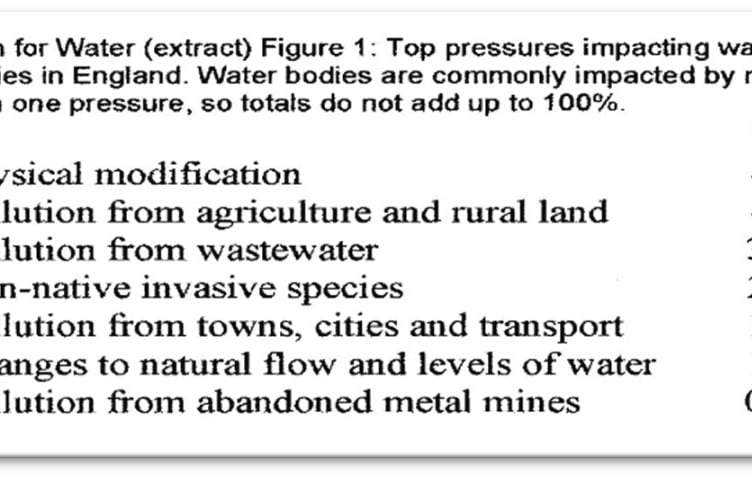Here’s a fact that will surprise many. Agriculture is the leading polluter of our streams, rivers, and oceans. Not water companies. The Defra published league table (Pictured) from Plan for Water 2023 spells it out.

Today’s negative noise and the recent past has all been about the perceived profit guzzling water companies and their pollution misdemeanours. If you once give a dog a bad name, albeit self-inflicted, it usually sticks.
Meanwhile the agricultural fraternity has been more than happy for water companies to take the negative river pollution heat from both public and regulators despite the dubious top spot accolade. So how did we or they get here?
Not difficult to explain. As a nation we have for decades encouraged farmers to grow more and more, faster and faster. That has been our priority and to an extent the environments burden. When told to jump farmers have responded positively with how high.
A consequence has been that water pollution from run-off from livestock, crop fertilisation, and other activities, has increased. Agricultural regulatory strategy, principally through the Environment Agency (EA), with oversight from Defra and the Government, has been light touch, advice, farm visits, inspections, grants, recommendations etc.
In 2023 the EA inspected *4% of 106,000 farms in England under new ‘Farming Rules for Water’ (FRFW) which was introduced in 2018. The inspections resulted in over 5000 no-penalty improvement actions required to improve farm practices ranging from storage of slurry to management of nutrients and soils.
[*An individual farm inspection ratio of once every 25 years]
Just one pollution prosecution has been brought in the 6 years since the FRFW introduction, compared to many more water company prosecutions and consequent heavy fines.
In 2022 Sir James Bevan, then EA Chair, gave evidence to the House of Commons Environment, Food, and Rural Affairs Committee saying that tougher new farming rules (FRFW) were ”not enforced for the first couple of years because the Government asked us not to do.”
You can begin to see the inconsistencies of non-joined up Government policy. If we want cleaner rivers it has to be a holistic approach.
Take another contradictory example currently being played out on the River Wharfe in Ilkley; the country’s first Defra designated river bathing water stretch in 2020.
Yorkshire Water has been pressured to invest almost £100 million in Ilkley on treatment works, overflow improvements etc to improve the bathing water classification; currently rated by the EA as ‘Poor’ and ‘not to swim advice’ in each of the last 4 years.
Following recent intensive Wharfe catchment studies the EA is concerned that the bathing water will continue to fail, despite the massive YW investment simply because of significant agricultural pollution from the wider River Wharfe catchment upstream of the bathing water.
So what to do? All eyes on the Government for a consistent and deliverable approach. Platitudes don’t help farmers, especially since the budget announcement. Steve Reed, Environment Secretary July 2024:
“I will fight the corner of farmers all the way. It is clear from meeting farmers and growers they have been neglected for too long, and confidence is at an all-time low. But this government will give them their futures back. We will offer a new deal for farmers across the country to boost rural economic growth and strengthen Britain's food security.”
Meanwhile the farmers, the water companies, the public, the environment wait. Message to Government: Do you want more food, more nature, more water quality.
Rising water bills to pay for higher river water quality is pointless without curbs on agricultural pollution. Farmers will oblige but that means less UK food production and more imported food. And more compensation for farmers for set-aside land.
More clarity Government. No more short-term vacillation please (in the meantime don’t hold your breath).




